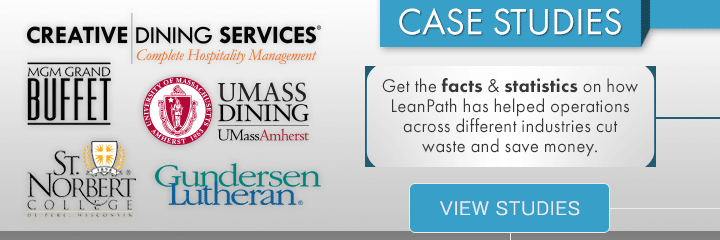Community Spotlight: Boloco

Boloco is a regional restaurant chain headquartered in Boston that offers bold and inspired wraps and smoothies. A Certified Green business but not one to boast, Boloco is “quietly doing our part to help the earth without making a big deal out of it.”
With this mindset, Boloco saw an opportunity in December 2014 to pilot the LeanPath Zap restaurant food waste monitoring software across four of its restaurant locations to track and reduce pre-consumer food waste over the course of three months. At the conclusion of the pilot program, I sat down with Director of Culinary, Eric Kinniburgh, to get his thoughts on the program.
What drove you to implement the LeanPath program?
“The main driver was really two-fold. The first driving factor was sustainability. We wanted to reduce the amount of waste going into compost or landfill. There are a lot of challenges with composting—if it’s contaminated, they’ll reject the entire truck. Rather than focus on that issue, we thought ‘what if we started with reduction and put less product in the compost trucks?’
The second driver was cost. When we see food cost is high, we have to dive into that. If we don’t have data on waste, it’s hard to narrow it down. Waste is a very important piece. Those two driver together seemed to make this an easy decision.”
What were you most excited about when you learned about the LeanPath Zap program?
“The major piece in the LeanPath offer that a lot of other programs don’t offer is reporting. And this reporting leads to accountability. Reporting gives us the data that says ‘this is the item you need to focus on.’ Reporting allows us to hold operations accountable for what they do.”
How did you position the program when rolling it out internally?
“Our main strategy was to set the precedent out of the gate that this data and the program will never be used as a disciplinary tool. If they feel like it will, they’ll report different numbers. We wanted our teams to know that we’ll be using this as a data collection tool and analyzing aggregate data, not specific employees. Our mantra was “share, share, share the data”; get the reports to the team, talk about it, keep it part of our vernacular on a day-to-day-basis. If employees see it as a priority by management and executives of the company, it will be a priority for them.”
What did the waste data reveal?
“The data highlighted the overproduction of quinoa, as well as our top three proteins. To employees, quinoa looks a lot like rice, but it’s much more expensive. For managers to see that and make adjustments, that was a big change. Also end-of-the-night production—we could see who is overproducing what, and GMs could determine what the acceptable amount left-over at the end of the shift should be.”
What changes have you seen in terms of culture?
“Teams are focused more intently on the waste of the restaurant. That’s exactly what I wanted—I wanted waste to become part of the conversation at the stores; to become part of our vocabulary. If you go into those four stores, they can talk educationally about their waste and specific data points, where the other 16 stores can’t.”
What advice would you offer to other restaurants considering the program?
“Share the reports and use the reporting tool! The restaurants that did not consistently review and print the reports saw very little impact—but that’s to be expected. If you don’t use the tools, it’s not going to work. Use it as an accountability tool and use the reports.”
To read case studies of sites using the LeanPath system, featuring unique examples and waste data, click below.

